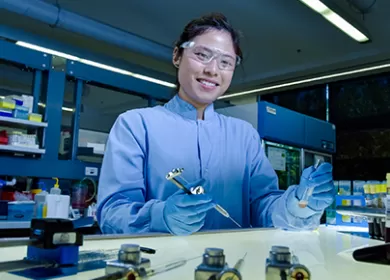Caring for donors
Donors are the lifeblood of our organisation.
Donors are the lifeblood of our organisation.
We collect around 31,000 donations every week to meet the constant demand for life-saving products, and our only source is volunteer donors. To make sure our donors keep coming back, researchers at Lifeblood investigate ways to improve the donation experience and keep our donors happy and healthy.
Australia is one of the few blood services in the world to have established a Donor Research program. Our team, led by Dr Tanya Davison, includes researchers with diverse backgrounds in psychology, public health, biostatistics and economics. Recent research by this team has shown that directly addressing a first-time donor’s anxiety in the period leading up to their first appointment can increase the chance they’ll follow through with their donation.
Beating the butterflies
When a first-time donor books a blood donation, their initial good intentions can give way to “butterflies” as their donation approaches — and sometimes they don’t follow through with the donation as a result. A new strategy devised by our Donor Research team is designed to help donors manage their anxiety through this critical period of their donation career.
The novel approach is based on research led by Prof Barbara Masser (Australian Red Cross Lifeblood Joint Chair of Donor Research, University of Queensland , ). Barbara explains, “There is a voice at the back of new donors’ heads saying ‘You don’t have to do this. You could just not do it, that’s OK’. So, we’re trying to intervene in that period and say ‘We know. We recognise that you are thinking all these things. It’s not that unusual, and here are some things you can to do to manage those doubts.”
The team worked with Lifeblood’s Marketing team to develop a range of materials to assist new donors. The materials were tested on over 3,600 new donors. Using an internationally respected research design, the outcomes of this study told us that an email combined with a phone call produced the best result, and has become the new standard way we communicate with new donors before their first donation.
Feeling great when you donate
Most of our donors feel fine during and after their donation. But a few (10% of first-time donors, less than 2% of donors overall), experience symptoms — dizziness, feeling hot and sweaty, blurry vision, and even fainting — either during or after their donation. These symptoms are caused by a drop in blood pressure. A few simple techniques, such as drinking two cups of water immediately before donation or tensing the large muscle groups in the body, may help prevent the symptoms.
Our Donor Research team are enlisting the help of donors and staff at the Liverpool and Parramatta donor centres to test how we can most effectively teach our donors how to feel great every time they donate. “We want to help our donors take control over the way they feel during a donation — the happier they are, the happier we are,” says Amanda Thijsen, Senior Research Assistant, who is leading this research project.
We value all our donors, and hope to retain these valuable relationships over time. Our Donor Research team is constantly working to ensure that each of our donors stays happy and healthy throughout their donation career.
